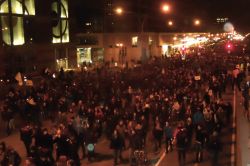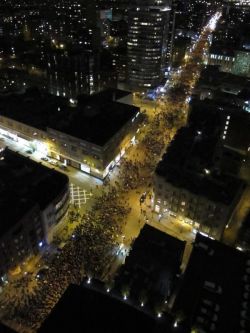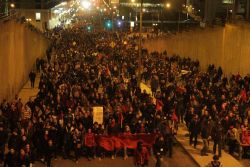Coop média de Montréal
Journalisme indépendant
Fifteen thousand take to Montreal streets as Quebec government plays semantics, blocks negotiations
It didn't take long; as always, the consensus among the media came quickly: Downtown turns into battlefield, Another demonstration goes sour, Montreal student demonstration turns violent, Violence breaks out during student protest...
At the end of a day where 15,000 people took to the streets, a day that saw the provincial government play the worst kind of politics during negotiations with student representatives, you'd be hard pressed to get any of that from the night's headlines.
Also invisible from those opening lines are any mention of police actions. Actions which, if you were watching the live stream from CUTV, checking out clips on Youtube, or even following nearly any twitter feed (let alone if you were actually at the protest), did more to set off tensions than anything protesters did tonight.
The day's events were set in motion by Education Minister Line Beauchamp's announcement that she was expelling the Coalition Large de l'Association pour une Solidarité Syndicale Étudiante from the negotiating session meant to find a resolution to the 11-week-old student strike that has swept the province. CLASSE represents 50 per cent of the 180,000 students on strike and were largely responsible for launching the strike in the first place. They have also been a constant thorn in the side of the government, organizing the most radical acts of civil disobedience and maintaining a firm line of demanding the continuation of the province's tuition fee freeze.
Why were they expelled? After the coalition adopted a clear position against violence towards people, but encouraging civil disobedience, Minister Beauchamp demanded that CLASSE agree to a 48-hour truce for negotiations. During this time, they would be allowed to organize traditional protests (which they did Wednesday afternoon), but not engage in economic disruption. While CLASSE did not have a mandate to sign a truce, they did state that they had no disruptive actions planned for the next 48 hours. The Fédération des Étudiants Universitaire du Québec as well as the Fédération des Étudiants Collégial du Quebec (FEUQ and FECQ) had already previously spoken out against "violent actions," including acts of vandalism and civil disobedience.
At Monday at 4pm, all three associations sat down with government representatives for the first time since the strike began.
Less than 40 hours later though, it was all over.
Since the start of the strike, CLASSE has maintained a website featuring a Google Calendar that showed all student actions across the province, including those that involved what the government defines as disruptive or violent actions. This didn't appear to be a problem to start the truce, but it did serve as the excuse to end it. The ostensible reason was a march on Tuesday night which was announced on that calendar included at least one count of property destruction (a broken window), and confrontation with police that resulted in five arrests.
Clearly looking for a pretext to once again attempt to split the tuition freeze movement and to marginalize the association with the most radical - and persistent - membership, Line Beauchamp took to the airwaves at 2pm Wednesday, announcing that CLASSE was expelled from the negotiations. Within several minutes, the other two federations walked away in solidarity.
A protest had already been called a week earlier for Wednesday night, and the government's arbitrary discussion to cut short negotiations - before, by most accounts, they had even really started going - led to people understandably being angry and looking for a way to express that.
As Daniel Crespo, one of the organizers of last night's demonstration, told Cyberpresse:
«Évidemment on souhaite une manif énergique. Calme, c'est pas le mot...En ce moment, je crois que le sentiment qui se vit au sein des étudiant-e-s c'est la colère. Alors le calme, je ne crois pas qu'on en ait.»
"Obviously, we're hoping for an energetic demo. Calm isn't the word...Right now, I think the feeling students have is anger. So 'calm'? I don't think we have any."
That said, I have been in the middle of much angrier marches than what hit Montreal last night.
Fifteen thousand people were in the streets last night. Fifteen thousand who were fed up with a government that earlier in the day essentially spit in the face of the student strike movement, demonstrating the same condescension, arrogance and rejectionism that has characterized their approach to this movement, one of the largest social movements in the history of not just Quebec, but of Canada.
And despite all this anger, it was mostly channeled through chanting and speeches. All it took though was a few paint balloons and six broken windows before 15,000 people were announced illegal. Targeted for property destruction were banks, Loto-Québec and a Military recruitment centre: not random targets, but symbols of the government and the economic powers which are behind the push for higher tuition fees and with them higher debt. When the government refuses to negotiate in good faith for over two months, and slams the door when negotiations finally begin, is it any wonder that people would turn their frustrations on the symbols of that government and those who back them?
The response of police was unannounced and muscled. I was just a few metres from where the first percussion grenade went off, in the middle of the crowd, and I feel confident saying that the use of these weapons came before most - if anyone - in the streets knew that the march had been declared an illegal assembly. It was only after that the crowd scattered that a voice was heard over the police loudspeaker announcing the march an illegal assembly. And looking to accounts posted on social media, I'm definitely not alone in that assessment. By the time the announcement was heard, police were already forcing into the crowd, separating it, with small groups of people scattering in all directions near the corner of Peel and Ste-Catherine.
From other parts of the march have come reports of police on horses charging crowds, excessive use of pepper spray and gas, battoning and tear gassing. It was only after this excessive intervention that the more aggressive tactics - a car lit on fire, more windows smashed, rocks thrown at police - took place.
Some will clearly argue that once a single window is broken, that the law is broken and police have every right to intervene. But can six broken windows justify the police aggression documented last night? And if six broken windows can make 15,000 people targetable for dispersion and arrest, then what does a tear gas cannister to the chest, or a concussion grenade to the eye, or a baton to the head or ribs, or a car ramming through a crowd equal? All are clearly more dangerous to the health and safety of individual people: police aren't taking on objects when they agress, they are taking on flesh and blood.
When all was done - around 1am - 85 people were arrested (70 in a mass arrest near St-Dominique and des Pins at the very end), accounts of police brutality were innumerable on social media, and students and supporters were vowing to fight on.
This morning, Quebec Premier Jean Charest was once again denouncing student violence as the obstacle to continue negotiation, playing out the same tired lines he and Minister Beauchamp have had on repeat for weeks. Tired lines that have, and will, do nothing to end this conflict.
About the poster
The site for the Montreal local of The Media Co-op has been archived and will no longer be updated. Please visit the main Media Co-op website to learn more about the organization.







